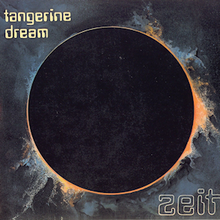Zeit
| Zeit (Largo in Four Movements) | ||||
|---|---|---|---|---|

Original 1972 LP album cover / 2002 CD album reissue
|
||||
| Studio album by Tangerine Dream | ||||
| Released | August 1972 | |||
| Recorded | May 1972 | |||
| Studio | Dierks Studio | |||
| Genre | ||||
| Length | 74:29 | |||
| Label | Ohr | |||
| Producer | Tangerine Dream | |||
| Tangerine Dream chronology | ||||
|
||||
| Alternative cover | ||||

1986 reissue cover
|
||||
| Professional ratings | |
|---|---|
| Review scores | |
| Source | Rating |
| AllMusic | |
| Uncut | |
Zeit (English: Time) is the third studio album by German electronic music group Tangerine Dream. A double LP, it was released in August 1972, being the first release featuring Peter Baumann, who joined then-current members Christopher Franke and Edgar Froese. Zeit is subtitled Largo in Four Movements.
The style of this album is slower and more atmospheric than their previous albums. AllMusic wrote, "TD's purest expression of 'space music', this double album ebbs and flows effortlessly from one tone cluster to another. Almost classical in construction, the music is structured so as to evolve in sections as one theme literally melts into the next." Music critics often refer to Zeit as being one of the first (or perhaps the first) examples of dark ambient music.
Florian Fricke from the Munich-based group Popol Vuh plays Moog synthesizer on the record, and four cellists appear on the first track. The album cover depicts a solar eclipse.
As explained by Paul Russell for the 2002 reissue, "Zeit, which means 'time', was based on the philosophy that time was in fact motionless and only existed in our own minds."
Zeit was released in August 1972 by record label Ohr.
Before the 2002 reissue, there were two common releases on CD: a single CD release by Castle Music and a double CD set. The double CD set from Relativity in 1987 is longer by a few seconds, mainly because of longer inter-track gaps. Relativity also put out a single cassette, with the following song timings: 20:00, 18:00, 20:12, 17:43. The sound of the two releases is also strikingly different; the original Relativity release has a much brighter and more detailed sound. The Castle release was remastered from the original master tapes over a decade later and there seems to have been a deterioration in quality since then, as it exhibits a notably muddier and bottom-heavy sound. The double CD set has a light blue border on the front and back covers.
...
Wikipedia
